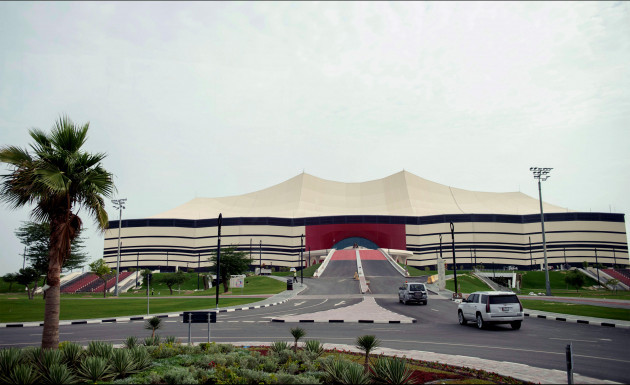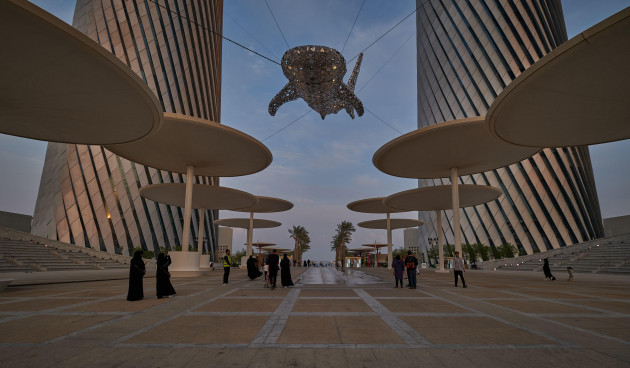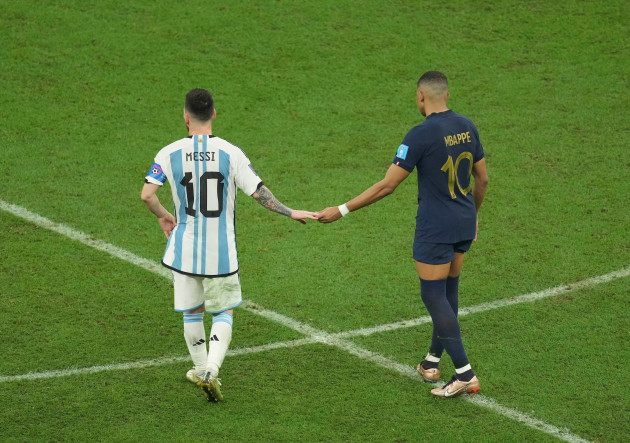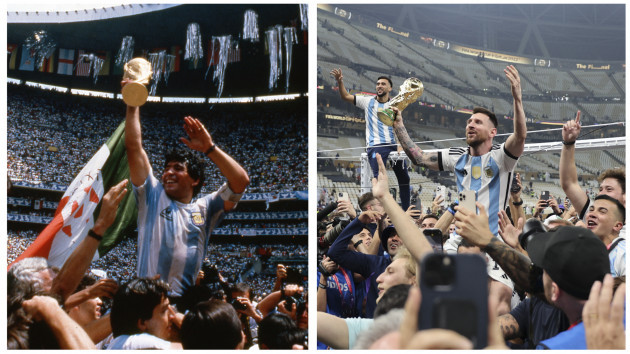SO.
What was that all about?
*****
There were times during Qatar’s World Cup when I felt we couldn’t believe what our eyes were telling us.
As the tournament went on, the lesson I learned was that we shouldn’t believe what we were seeing.
The early days of the tournament were wild, distorting. Part of that was down to the pace of the news cycle but also the wild contradictions of the place. It felt like living in a Flann O’Brien novel.
A tent-shaped stadium with lush rectangles of tended grass rose from an empty desert. Qatar’s ultras turned out to have been recruited from Lebanon. The attendances at games were initially larger than the published stadium capacities. Fifa announced they were investigating homophobic chanting by Ecuador fans in a country that has criminalised homosexuality. Goals were disallowed as AI technology flagged offsides not visible to the human eye. Gianni Infantino attended Qatar’s national anti-corruption awards, for which there was a cash prize. Oh, sorry sir, we are not printing out teamsheets as the tournament is a carbon net-zero event. Also, please remember to bring a jumper to the stadiums as we are air conditioning the sky.
Language itself came under assault, with walls and screens festooned with banal slogans like ‘Feel the Moves’, ‘Now is All’ and, a classic from the Conmebol exhibition in downtown Doha, ‘Football is Football.’ The point of these slogans was their total absence of meaning. ‘One Love’ on captains’ armbands meant nothing until Fifa banned it, at which stage it was replaced by the meaningless ‘No Discrimination.’ It was a clarifying moment: these slogans can only be displayed if they mean nothing.
Amid all the shapeshifting and the doublespeak and the whataboutery, how magnificent it was to hear Roy Keane speak plainly and scythe through it all.
“The World Cup shouldn’t be here. It shouldn’t be here. The corruption, regarding Fifa, you’ve got a country, the way they treat migrant workers, gay people: I think it’s great that it’s been brought up. They shouldn’t have the World Cup here. You can’t treat people like that.”
Gianni Infantino kicked off the tournament by deriding the moralising of the Western media in his I Have a Fever Dream speech, but part of the reason Qatar hosted the World Cup was to court that Western opinion. Within days of landing I started getting twice-daily notifications from an English-language subreddit, r/Qatar, which I’d never visited before. Its most popular posts were generally of Westerners giving favourable reviews of Qatar, insisting that we shouldn’t believe what the Western media have told you about this place.
The journalist’s experience here was privileged but it was also curated, manicured; Fifa set us on a burnished, frictionless treadmill from media hotel to media centre to stadium where the WiFi worked and there were plug sockets for all. Plus, we could go to two matches in a day during the group stage, meaning I saw a faintly ridiculous 26 football matches but this did not mean I saw the ‘real’ Qatar.
Instead we were shown the hyperreal Qatar. The whole country was given over to the World Cup for the month, and I read several journalists describe it as a kind of football Disneyland, which reminded me of Baudrillard’s thesis that they built Disneyland as an imaginary world to convince you that the rest of California was real. He wrote that they are one and the same, both built around images stripped of any original meaning where fact and fiction blended to the point of being indistinct from one another. It’s the same in Qatar, where the nation-building is as berserk and synthetic as its football project. Theirs is a true commitment to simulacra: head down to the district of Lusail, by the grand area which staged the final, and check out the boulevard based on the Champs-Élysées on your way to the replica Place Vendômes.
The ‘real’ Qatar is that which lurked under the surface and is the experience of the migrant workers on whose backs this playground was built. The workers I spoke to all had a range of experiences but all were linked by a blunt acknowledgement that opportunities here were better than they were at home.
One of those workers, Samuel, was most dispirited at the deadening definition of life in Qatar. He works as a security guard but isn’t allowed to do any alternative work, so said there was nothing to do but work and sleep. He has the energy and the desire to drive a taxi, he said, but faces either imprisonment or a massive fine were he to be caught doing any job other than that which he has been approved for. Samuel, like most migrant workers, paid an illegal recruitment fee to come to Qatar from Kenya and it took him eight months of work to pay it off. He now sends the bulk of his monthly salary of 1,000 riyals (€258) home to his wife and two children. It is still better than the money he made as a driver back home but when I asked him whether he believed this wealthy country should pay him more, he told me he understood why they didn’t: it would create a perception of diminished motivation to work. “The economics of the global economy”, he said.
He also told me “a man leaves a legacy”, saying he is working to ensure his children have a better life than his. He fears his daughter will be preyed upon in Kenya, saying the only way to protect against that is to “make her a lady of status.”
The business of Qatar is coldly transactional: Samuel told me he didn’t have two feet planted here but one with the other hovering and darting in mid-air, looking for the next opportunity. He wants to move to Europe or the US, where he will be allowed to work as many jobs as he can. First he will work as a chauffeur, he said, until he earns enough to set out by himself as a taxi driver. Some day, he said, he will have earned enough to study topography.
Samuel was friendly and gregarious, explaining this nature by giving me another saying from his home in Kenya, “An animal with a mouth will never be lost”, he said, explaining that someone, somewhere would eventually hear it howl.
He spoke to me as he speaks to everyone, as he believes it will eventually lead him to the right person, who can offer the right opportunity and a life in the West. Despite living in a land as prescribed and stratified as Qatar, Samuel maintains a firm belief in the aligning of circumstances and the kindness of strangers.
I walked away thinking I had just come across the most audacious act of the World Cup.
**********
Day 19.
The tap-tap-tapping of the quintet of Irish journalists in the media centre has slowed, as half the busy hands move to grip the edge of the table in response to another form of the ambient banality. A journalist is sitting behind us, mindlessly whistling one of the World Cup’s gnawingly catchy Official Songs.
“Look who we are”, goes the song, “We are the dreamers/We make it happen, ’cause we believe it.” The song is meaningless, bland, all-encompassing. The perfect World Cup soundtrack, in other words.
Everything at the World Cup was uniform, to the point that security guards ripped the labels off our water bottles if they were not that of the Official Water Partner
There is a purpose to all of this. The more controlled the World Cup is, the easier it is to make money from. Predictability = Profitability. Want to advertise your country through football? Fine, just make sure the World Cup looks exactly like the last one.
The polished sameness of it all was stupefying but ultimately a little comforting too. This, I suppose, is its intended effect.
The thundering inanity of the pre-game build-up was its worst manifestation, the too-loud PA system smothering any genuine atmosphere with Gala, Coldplay, and Seven Nation Army like it was any football stadium in Europe. These songs were punctuated by pitchside TV personalities cavorting with supporters, screaming about the fun they were clearly not having. The match itself was the last refuge of any kind of improvisation or collective experience, with every second outside of it filled with the Fifa-decreed blasts of the PA and painful, scripted presentation.
There was a certain uniformity about the football too. This World Cup felt like late-age tiki-taka, the competition at which it passed into redundancy in the sport’s endless cycle of ideas. Spain were eliminated as a bloodless parody of themselves and Hansi Flick lamented that Germany needed another “reboot” after their group-stage exit.
Sides like Saudi Arabia and Morocco showed how to defend against it: push high away from your own goal, and compress space in midfield. If teams just want to play two-touch, pass-and-move, then all you need to do is diligently deny them the space and angles to make it effective.
Perhaps too many international sides have adopted Guardiola’s first ideas, those same ideas that Guardiola himself has refined and adapted to the point he’s built his latest side around a Big Man Up Top. This latest vision should be heeded. It certainly was by France, who turned Olivier Giroud from graceful facilitator to an uncaring goal machine.
Guardiola’s former assistant Juanma Lillo wrote a brilliant column for The Athletic midway through the tournament. “It’s true now that there aren’t bad players any more. But there are no exceptional players either. In trying to kill the bad guys, we’ve killed the good guys, too.”
Thus many of the dominant individual players of the World Cup were those who existed outside of the orthodoxy, those who did not suffer from an excess of coaching.
None more so than the prince of alterity himself, Lionel Messi. This was undoubtedly his best-ever World Cup, the one at which he separated himself from Cristiano Ronaldo for good. Where Ronaldo flailed lamely against the dying of the light, Messi found ways of reigniting it.
His semi-final assist for Julian Alvarez was its best example: years ago he would simply have accelerated from Josko Gvardiol and thought no more about it. Today, without the pace to do so, he had to improvise, checking back to deceive him again. It was breathtaking, and proof that Messi’s greatness now comes not in spite of his age but because of it.
That Messi would bid farewell to the global stage by crowning his legacy was the most seductive tale of the competition, but there were other great stories told. The bravery of the protesting Iranian players and supporters in the face of their brutal regime. The Moroccan odyssey. The desperate end to Ronaldo’s career among the elite. The sheer noise of the Saudi Arabian supporters. Japan’s shock of Spain and Germany. The minting of Louis Van Gaal as international treasure. The reliably remarkable progress of Croatia. The breathless, days-long drama of the group stage finales, the greatness of the format underlined by the fact Fifa are ending it.
Ultimately, however, Messi’s story was completed, in arguably the best World Cup final ever and potentially one of the greatest games ever played. It was a night to show why Kylian Mbappe will be the best player of his generation and why Messi is the best of all those who came before.
Qatar and Fifa were determined to trademark the final moment, the Emir chivvying Messi into a diaphanous robe as Gianni Infantino pathetically man-marked him to the trophy lift.
But ultimately it is not through that image I will remember Messi’s triumph, but instead that of him hoisted high upon Sergio Aguero’s shoulders, trophy in hand and hundreds at his feet, like Maradona before him.
For a sport so entangled with the taint of money and amorality, football nonetheless has a remarkable power to create a single, isolated moment of purity; a fleeting image that tricks us all into believing this seemingly irredeemable sport might yet be redeemed by itself.
*********
I was in the Lusail Stadium press box on the night Grant Wahl died.
It was in the 113th minute of extra time when I noticed a commotion to my left, initially not understanding what was happening until I saw the ashen face of a journalist who was sitting next to him. Paramedics attended to him until the end of the game, at which point he was brought to hospital. His death was reported by NPR at 5.20am.
The penalty shootout took place to our left and every time I looked up to see the latest kick, I looked over the scene of a man lying on the ground as medics frantically fought to save his life. The crowd, oblivious, continued to scream and cheer. The football did not stop, even in the face of death.
And I didn’t stop either. As Grant Wahl was brought to hospital in the final hours of his life, I filed my match report and went to the post-match press conference. I don’t know why I did that, and I don’t expect to figure out why I did anytime soon.
What I do know is that which everyone is reminded of at times of tragedy. Life is beautiful, fragile and precious. And though this sport does not stall for death, it still celebrates life: it makes incarnate all of those intangible virtues we all know but never otherwise see expressed.
A migrant worker named Alex, who was originally from the Philippines, died in an accident at the Saudi Arabian team hotel during the course of the tournament. When Reuters asked the tournament’s CEO Nasser Al-Khater to comment on his death, this is how he responded.
“We’re in the middle of a World Cup and we’re having a successful World Cup and this is something you want to talk about right now?
“Death is a natural part of life, whether it is at work, whether it is in your sleep. A worker died, our condolences to his family but it is strange that is something you want to focus on as your first question.”
Qatar’s may have been the best World Cup we have seen in decades, overspilling with drama, crowned by a magnificent finale and endowed with Messi’s singular genius, but Al-Khater’s words are those by which I will ultimately remember it.
Twelve years, hundreds of billions of dollars and Messi’s genius feats will never scrub away such crass, callous contempt for life itself.




